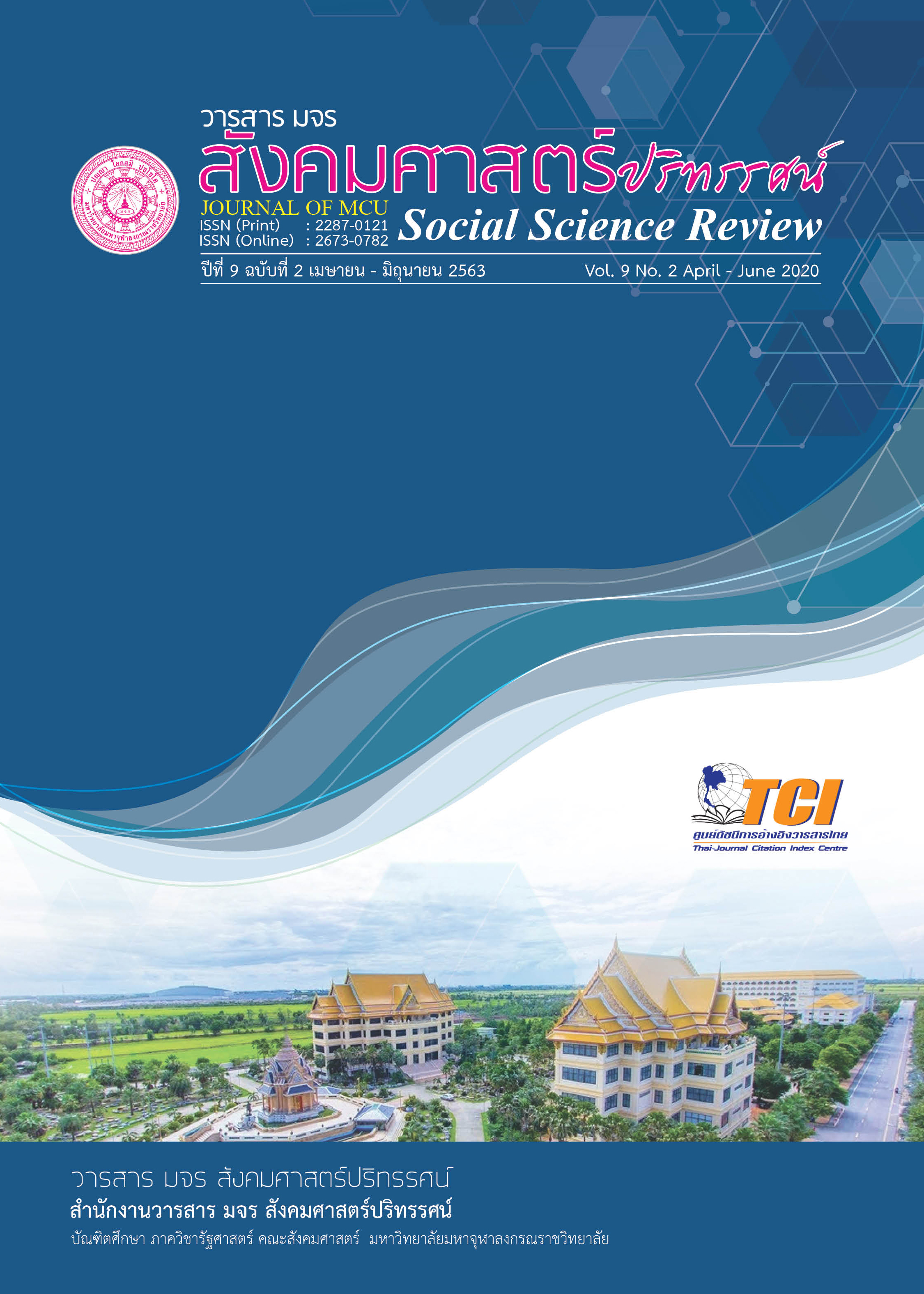เศรษฐศาสตร์การเมืองอาเซียน: ความสัมพันธ์ระหว่างประชาคมอาเซียน ตามหลักเศรษฐศาสตร์แบบพึ่งพา
คำสำคัญ:
เศรษฐศาสตร์การเมือง, ความสัมพันธ์ระหว่างประเทศ, ประชาคมอาเซียน, เศรษฐศาสตร์พึ่งพาบทคัดย่อ
บทความนี้มีวัตถุประสงค์เพื่อศึกษา EEC ใครได้ใครเสีย (หรือประชาชนได้อะไร)และเพื่อเสนอแนวทางที่เป็นประโยชน์และลดผลกระทบที่เกิดขึ้นต่อเขตพัฒนาพิเศษภาคตะวันออกโดยได้วิเคราะห์ประเด็นที่สำคัญได้แก่ ด้านสังคมและกฎหมาย ด้านเศรษฐกิจ ด้านความมั่นคง ด้านสิ่งแวดล้อมและสาธารณสุขจากการศึกษาพบว่าการพัฒนาเขตเศรษฐกิจพิเศษภาคตะวันออกก่อให้เกิดประโยชน์และผลกระทบหรือผลเสียในด้านต่าง ๆดังกล่าวดังนั้นการที่รัฐดำเนินการพัฒนาเขตเศรษฐกิจพิเศษภาคตะวันออกจำเป็นต้องคำนึงถึงความคุ้มค่าทางเศรษฐกิจเพื่อแลกกับผลกระทบที่จะเกิดขึ้นกับสังคมและกฎหมาย เศรษฐกิจ ความมั่นคง ตลอดจนสิ่งแวดล้อมและสาธารณสุข โดยหาวิธีการหรือแนวทางในการป้องกันผลกระทบ ตลอดจนการเพิ่มศักยภาพและสร้างโอกาสให้กับประชาชนในพื้นที่ EECเพื่อเตรียมรองรับการเป็นเขตอุตสาหกรรมการค้า การลงทุน การขนส่งระหว่างประเทศ การท่องเที่ยวการให้บริการและการเปลี่ยนแปลงทางเศรษฐกิจที่กำลังจะเกิดขึ้น
เอกสารอ้างอิง
คําสั่งหัวหน้าคณะรักษาความสงบแห่งชาติ ที่ 2/2560 เรื่อง การพัฒนาระเบียงเศรษฐกิจพิเศษภาคตะวันออก. (2563, 4 พฤษภาคม). ราชกิจจานุเบกษา. เล่ม 134 ตอนพิเศษ 19 ง. หน้า 30.
บรรจง กาญจนานิลและคณะ. (2560). บทบาทของรัฐในการพัฒนาเขตเศรษฐกิจพิเศษ:กรณีศึกษาเขตเศรษฐกิจพิเศษตราด. วารสารรัชต์ภาคย์, 12(26), 78-79.
ปวริศร เลิศธรรมเทวี และคณะ. (2560). การพัฒนาเขตเศรษฐกิจพิเศษตามแนวทางของอาเซียน (รายงานผลการวิจัย). กรุงเทพฯ: สำนักงานเลขาธิการสภาผู้แทนราษฎร.
พระราชบัญญัติเขตพัฒนาพิเศษภาคตะวันออก พ.ศ. 2561. (2563, 4 พฤษภาคม). ราชกิจจานุเบกษา. เล่มที่ 135 ตอนที่ 34. หน้า 2.
ศิริวรรณ มนอัตระผดุง. (2563). การจัดตั้งเขตพัฒนาเศรษฐกิจพิเศษเพื่อรองรับการเข้าสู่ประชาคมอาเซียน.สํานักวิชาการ สํานักงานเลขาธิการวุฒิสภา. สืบค้น 4 พฤษภาคม 2563, จาก http://library.senate.go.th/document/Ext8665/8665127_0008.PDF
สำนักงานคณะกรรมการนโยบายเขตพัฒนาพิเศษภาคตะวันออก (สกพอ.). (2563). โครงการเขตพัฒนาพิเศษภาคตะวันออก (อีอีซี) เป็นแผนยุทธศาสตร์ภายใต้ ไทยแลนด์ 4.0. สืบค้น 2 พฤษภาคม 2563, จาก https://www.eeco.or.th
สำนักงานคณะกรรมการพัฒนาการเศรษฐกิจและสังคมแห่งชาติ. (2563). ชายฝั่งทะเลตะวันออก: โอกาสใหม่สำหรับอุตสาหกรรม.วารสารเศรษฐกิจและสังคม. สืบค้น 2 พฤษภาคม 2563, จาก https://forbesthailand.com/commentaries/insights/eastern-economic-corridor-eec.html
โสภณ พรโชคชัย. (2563). ผังเมืองอีอีซีกับการขายชาติ. สืบค้น 1 พฤษภาคม 2563, จากhttps://www.area.co.th/thai/area_announce/area_press.php?strquey=press_announcement3476.htm
ilaw. (2563). "EEC" เขตเศรษฐกิจ "พิเศษ" สำหรับใคร?. สืบค้น 5 พฤษภาคม 2563, จากhttps://ilaw.or.th/node/5358
ดาวน์โหลด
เผยแพร่แล้ว
รูปแบบการอ้างอิง
ฉบับ
ประเภทบทความ
สัญญาอนุญาต
ลิขสิทธิ์ (c) 2020 วารสาร มจร สังคมศาสตร์ปริทรรศน์

อนุญาตภายใต้เงื่อนไข Creative Commons Attribution-NonCommercial-NoDerivatives 4.0 International License.
เพื่อให้เป็นไปตามกฎหมายลิขสิทธิ์ ผู้นิพนธ์ทุกท่านต้องลงลายมือชื่อในแบบฟอร์มใบมอบลิขสิทธิ์บทความให้แก่วารสารฯ พร้อมกับบทความต้นฉบับที่ได้แก้ไขครั้งสุดท้าย นอกจากนี้ ผู้นิพนธ์ทุกท่านต้องยืนยันว่าบทความต้นฉบับที่ส่งมาตีพิมพ์นั้น ได้ส่งมาตีพิมพ์เฉพาะในวารสาร มจร สังคมศาสตร์ปริทรรศน์ เพียงแห่งเดียวเท่านั้น หากมีการใช้ภาพหรือตารางหรือเนื้อหาอื่นๆ ของผู้นิพนธ์อื่นที่ปรากฏในสิ่งตีพิมพ์อื่นมาแล้ว ผู้นิพนธ์ต้องขออนุญาตเจ้าของลิขสิทธิ์ก่อน พร้อมทั้งแสดงหนังสือที่ได้รับการยินยอมต่อบรรณาธิการ ก่อนที่บทความจะได้รับการตีพิมพ์ หากไม่เป็นไปตามข้อกำหนดเบื้องต้น ทางวารสารจะถอดบทความของท่านออกโดยไม่มีข้อยกเว้นใดๆ ทั้งสิ้น





